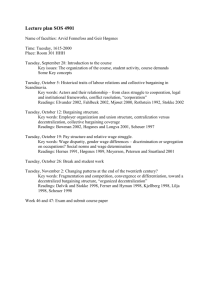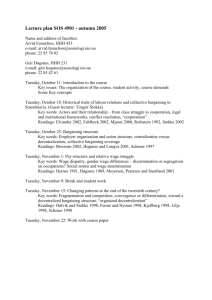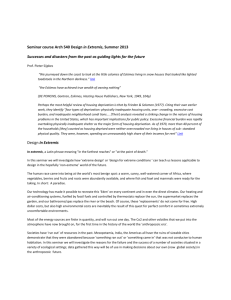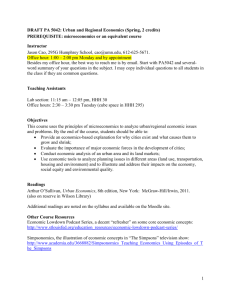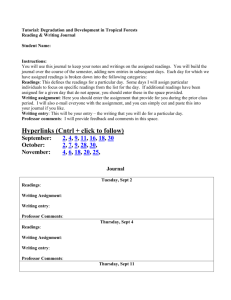PA 5522 - Humphrey School of Public Affairs Web Application Server
advertisement
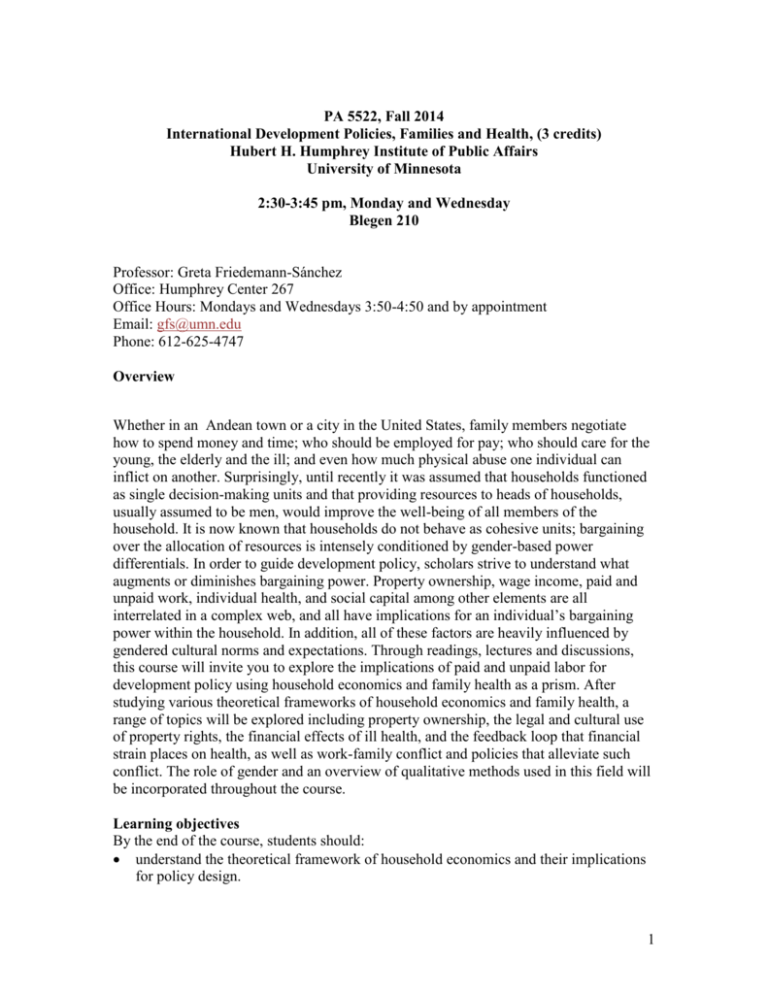
PA 5522, Fall 2014 International Development Policies, Families and Health, (3 credits) Hubert H. Humphrey Institute of Public Affairs University of Minnesota 2:30-3:45 pm, Monday and Wednesday Blegen 210 Professor: Greta Friedemann-Sánchez Office: Humphrey Center 267 Office Hours: Mondays and Wednesdays 3:50-4:50 and by appointment Email: gfs@umn.edu Phone: 612-625-4747 Overview Whether in an Andean town or a city in the United States, family members negotiate how to spend money and time; who should be employed for pay; who should care for the young, the elderly and the ill; and even how much physical abuse one individual can inflict on another. Surprisingly, until recently it was assumed that households functioned as single decision-making units and that providing resources to heads of households, usually assumed to be men, would improve the well-being of all members of the household. It is now known that households do not behave as cohesive units; bargaining over the allocation of resources is intensely conditioned by gender-based power differentials. In order to guide development policy, scholars strive to understand what augments or diminishes bargaining power. Property ownership, wage income, paid and unpaid work, individual health, and social capital among other elements are all interrelated in a complex web, and all have implications for an individual’s bargaining power within the household. In addition, all of these factors are heavily influenced by gendered cultural norms and expectations. Through readings, lectures and discussions, this course will invite you to explore the implications of paid and unpaid labor for development policy using household economics and family health as a prism. After studying various theoretical frameworks of household economics and family health, a range of topics will be explored including property ownership, the legal and cultural use of property rights, the financial effects of ill health, and the feedback loop that financial strain places on health, as well as work-family conflict and policies that alleviate such conflict. The role of gender and an overview of qualitative methods used in this field will be incorporated throughout the course. Learning objectives By the end of the course, students should: understand the theoretical framework of household economics and their implications for policy design. 1 be able to identify the components of intrahousehold bargaining. be able to articulate the roles of bargaining component for gender equity. be able to characterize the issues surrounding paid and unpaid labor and differentiate them from paid caregiving and unpaid caregiving. be able to identify significant problems that characterize international development policies with regards to households and families, paid and unpaid labor, paid and unpaid caregiving. be able to identify the importance of understanding households processes for policy that may target gender inequities. be able to understand the aims and purposes of quantitative and qualitative methodologies. In addition, Students will develop the analytical skills to sort different types of development challenges when household economics and household health are analyzed with a gender perspective. Course structure, requirements and grading Class meetings Our class meetings will be seminar-style structured with lectures and discussions. Substantial lecture sections at each class meeting will provide enough background information to contextualize the readings. About half of the time we will explore the material through discussions. The discussions will take three forms: 1. Electronic board active-reading exercise: To inspire timely reading of the articles and to help you think about what you are reading, a very short commentary, 150 words, on the readings is required. Commentary should be posted on the discussion forum in the course moodle website. The posting should not summarize the readings but rather explore why an idea is important or relevant. For instance you can recreate an issue brought up in the readings, or connect two conflicting arguments that the readings bring up, or comment on how the readings dialogue with each other. You may ask questions that are sparked by the readings, or even better you may comment on how the readings present opposing or supporting views. In order to get credit, you need to post by 10:00 am every Monday and Wednesday. The intent of using the electronic message board is to help you think through the readings, to read other students’ logs and see what ideas they bring to the discussion. The electronic board conversation will also help us have a deep dialogue in class. Last, the electronic board helps me as well by providing me some guidelines to make the lectures speak back to you. So, please read each other's postings, feel free to comment on other people's remarks. I do read every one of the postings, if I do not comment back it does not mean I am not reading. Electronic board participation will count for 30% of the grade. You are expected to participate at least once for every class. You are required to read the comments of other class members before class. Please keep your postings short. Please refer to readings by the last name of the author. Commentaries will receive letter grades: 0 for no posting, 1 for unsatisfactory to weak, 2 for satisfactory, 3 for excellent. Grading criterion: 2 thoughtfulness of the comments. Postings received after the readings are due will not be accepted for grading purposes, although they will be read and used in class Life happens and we all have competing demands, so you can skip two weeks of postings. There are 20 posts possible, you are required to post 15 times. 2. Class participation: Elements of class preparation include attendance, lateness, preparing before class by reading the material and students’ posting, listening to others, speaking during class, and respect for your classmates. We will be discussing the readings and material presented during class so that students can deepen their own understanding of the subject. The purpose of the discussions is to examine and evaluate the different topics presented. Class participants are encouraged to enter into debates that challenge ideas! Just remember to keep the conversation respectful by listening, clarifying your understanding of issues, by keeping your questions to the ideas and by not engaging in personal criticism. Do participate, do not expect other students to “cover the crater of silence,” if you don’t understand the material, say so, please. Do not doubt yourself: participate! Everyone is expected to participate in class discussions which will count for 30% of the grade. A note on attendance: Missing classes and/or being late regularly will lower your class participation grade, regardless of whether you learn the material or not. (Exception: regular lateness because of dashing from another class – if you inform me at the beginning of the semester.) Please contact me – before class – if you are ill and cannot attend. If you are absent for students’ presentations at the end of the semester, your grade will be deducted a full 10 points. Final research paper and presentation My goal with the final research paper and presentation is to foment the integration of students’ interests with the class material, to think critically about the issues of the course and to present their explorations to the class. We will divide the class into groups. Each group will choose a country or region of interest, a topic from the syllabus that is of interest, and write a research paper on the policies such region has on the topic selected. You will present research results to the entire class. This is a policy school, in an effort to prepare you for the future, please prepare both your paper and presentations as if this were a professional presentation. This means using this presentation as if it were a job interview or a professional presentation: having proper dress, handouts if any ready for audience, power point if it fits the topic. What will help your audience better understand your presentation? Having several people present or have one spoke person? Having one presenter and one person who answers questions from the audience? Dividing topic presentations among team members? Regardless of who presents, your group will be graded as a team. Each group member will fill out a peer-evaluation form which I will take into account when assigning the individual grade for the paper. I will also provide feedback on paper and on presentation, the later which will make your job interview easier. Final research paper, presentation, and peer-evaluation will count for 40% of the grade. Note that if you miss a colleague’s presentation, you and your group will be deducted 10 points, out of 100 points possible for the entire course. 3 Paper guidelines Papers cannot exceed 5,000 words excluding references, tables, and figures. They must be doubled spaced with 12 point font, one inch margins. Please note if you want comments on the paper or not. If you do, I will send those back via email as track changes. Papers are due December 17 at 10 am via email. Subject line should read “5522 FINAL PAPER.” Grades Class Participation 30 points Discussion Board 30 points Paper, presentation and attendance at other’s presentation 40 points The University of Minnesota defines the meaning of grades as following: A is for achievement that is outstanding relative to the level necessary to meet course requirements, B represents achievement that is significantly above the level necessary to meet course requirements, C represents achievement that meets the basic course requirements, D represents work that is worthy of credit even though it does not fully meet the basic course requirements in every respect, and F is for work that falls sufficiently short of meeting the requirements of the course that it does not merit credit. I grade according to these definitions. Academic integrity Academic integrity is the pillar of teaching and learning. Students are expected to complete the assignments with honesty. Misrepresenting someone else's work as your own, can result in disciplinary action. The University Student Conduct Code defines scholastic dishonesty as follows: SCHOLASTIC DISHONESTY: submission of false records of academic achievement; cheating on assignments or examinations; plagiarizing; altering, forging, or misusing a University academic record; taking, acquiring, or using test materials without faculty permission; acting alone or in cooperation with another to falsify records or to obtain dishonestly grades, honors, awards, or professional endorsement. Within this course, a student responsible for scholastic dishonesty can be assigned a penalty up to an including an "F" or "N" for the course. If you have any questions regarding the expectations for a specific assignment or exam, please ask. I will be more than happy to discuss the elements and expectations at length. Incompletes This course follows the Humphrey Institute policy regarding incompletes. An incomplete will only be granted after the Professor and the student have mutually agreed upon a timetable (written contract) for completion of coursework. An incomplete must be requested in advance, and the Humphrey Institute incompletes form must be filled out. The form is on-line at: http://www.hhh.umn.edu/img/assets/11160/Incomplete%20form.pdf 4 Disabilities It is University policy to provide, on a flexible and individualized basis, reasonable accommodations to students who have disabilities that may affect their ability to participate in course activities or to meet course requirements. Students with disabilities are encouraged to contact their instructor early in the semester to discuss their individual needs for accommodations. Mental Health As a student you may experience a range of issues that can cause barriers to learning, such as strained relationships, increased anxiety, alcohol/drug problems, feeling down, difficulty concentrating and/or lack of motivation. These mental health concerns or stressful events may lead to diminished academic performance or reduce your ability to participate in daily activities. University of Minnesota services are available to assist you with addressing these and other concerns you may be experiencing. You can learn more about the broad range of confidential mental health services available on campus via www.mentalhealth.umn.edu http://www.mentalhealth.umn.edu Required readings Most readings are available electronically. A few are located in the course website. Required book purchases No required textbook. Other Resources International Center for Research on Women http://www.icrw.org/ The Center for Global Development http://www.cgdev.org/ http://www.developmentideas.info/download/ www.idrc.ca The World Bank http://www.worldbank.org/ Inter-American Development Bank http://www.iadb.org/ Food Policy Research Institute http://www.fpri.org/ United Nations Development Programme http://www.undp.org/mdg/basics.shtml United Nations Refugee Agency http://www.unhcr.org/cgi-bin/texis/vtx/home Pan American Health Organization http://www.paho.org/english/mdg/cpo_origins.asp Redefining Progress http://www.rprogress.org/sustainability_indicators/genuine_progress_indicator.ht m Communication My preference is to communicate with students in person or by phone. My office hours are Wednesdays 3-4 pm and Thursdays 4-5pm. If this time does not work we can find an alternative time. Please call me to discuss or email Donna Kern at kernx008@umn.edu. 5 PA 5522 – Fall 2014 Weekly Reading Schedule If possible read the selections in the order listed. All readings are required. If you want additional readings on a topic, please let me know. I will be glad to provide additional bibliography. Week 1 (Tuesday, September 2) Introductions, course expectations, logistics, reviewing syllabus Syllabus PA 5522 - yes the syllabus for the class - every line. Bring questions you may have. (Thursday, September 4) Families Why are they important? How do families matter? Ji, Y. 2013. Negotiating Marriage and Schooling: Nepalese Women’s Transition to Adulthood. The ANNALS of the American Academy of Political and Social Science 646:194-213. Oppong, C. 2006. Familial Roles and Social Transformations: Older Men and Women in Sub-Saharan Africa. Research on Aging 28:654-668. Please watch: Stephanie Coontz on Marriage available at: http://www.youtube.com/watch?v=gwtb7jz8G4k Week 2 (Tuesday, September 9) What is Development? Harriss, John. 2013. “Development Theories.” In International Development: Ideas, Experience and Prospects. International Development Research Center: Digital Library. Chapter 2, pp 1-41. URL http://hdl.handle.net/10625/51544 (Thursday, September 11) WID and GAD Singerman, Diane and Homa Hoodfar. 1996. The Household as Mediator: Political Economy, Development, and Gender in Contemporary Cairo. In Development, Change 6 and Gender in Cairo. D. Singerman and H. Hoodfar, eds. Pp. xi-x1. Bloomington: Indiana University Press. Hoodfar, Homa. 1996. Survival Strategies and the Political Economy of Low-Income Households in Cairo. In Development, Change and Gender in Cairo. Diane Singerman and Homa Hoodfar, ed. Pp. 1-26. Bloomington: Indiana University Press Week 3 (Tuesday, September 16) Measuring Development with a gendered lens In class Film: Who’s Counting? Chant, Sylvia. 2006. “Contributions of a Gender Perspective to the Analysis of Poverty: Women and Gender Equity in Development Theory and Practice. Institutions, Resources and Mobilization.” In Women and Gender Equity in Development Theory and Practice. Institutions, Resources and Mobilization. J. Jaquette and G. Summerfield, eds. Pp. 87106. Durham: Duke University Press.’ (Thursday, September 18) Unitary Household Model Ferber, Marianne. 2004. Feminist Critique of the Neoclassical Theory of the Family. In Women, Family and Work: Writings on the Economics of Gender. Oxford: Blackwell Publishing. Pp 9-23 Hénaff, Marcel. 2009. The Prajâpati Test: Response to Amartya Sen. In Against Injustice. Cambridge University Press. Pp66-70 Bergmann, Barbara. 1981. The Economic Risks of Being a Housewife. American Economic Review 71(2):81-86. Week 4 Heterodox Household Models Tuesday, September 23 Doss, Cheryl. 2004. Conceptualizing and Measuring Bargaining Power within the Household. In Women, Family and Work: Writings on the Economics of Gender. Oxford: Blackwell Publishing. Pp 43-61 Quisumbing, Agnes R. 2003. “What Have We Learned from Research on IntraHousehold Allocation?” Household Decisions, Gender and Development: A Synthesis of Recent Research. Agnes Quisumbing, editor. Washington, DC: International Food Policy Research Institute. Chapter 1 (pp. 1-16). (Thursday, September 25) Agarwal, Bina.1997.Bargaining and Gender Relations: Within and Beyond the Household. Feminist Economics 3(1):1-51. 7 Week 5 Intrahousehold Bargaining Models in Action(Tuesday, September 30) Intrahousehold Bargaining Models in Action- Division of labor Sayer, L. C. and S. M. Bianchi. 2000. Women's Economic Independence and the Probability of Divorce: A Review and Reexamination. Journal of Family Issues 21:906943. Michael Bittman, Paula England, Liana Sayer, Nancy Folbre, and George Matheson. 2003. When Does Gender Trump Money? Bargaining and Time in Household Work. American Journal of Sociology 109:186-214. Logistics: Students should be grouped by the end of this week and chosen a region and topic. Be ready to provide a 3 minute summary of your topic during class (Thursday, October 2) Intrahousehold Bargaining Models in Action- Income allocation Roldán, Martha.1988. Renegotiating the Marital Contract: Intrahousehold Patterns of Money Allocation and Women's Subordination Among Domestic Outworkers in Mexico City. In A Home Divided: Women and Income in the Third World. D. Dwyer and J. Bruce, eds. Stanford: Stanford University Press. Raynolds, Laura. 2002. Wages for Wives: Renegotiating Gender and Production Relations in Contract Farming in the Dominican Republic. World Development 30(5):783-798. Week 6 Tuesday, October 7 Gender Asset Gap Deere , Carmen Diana, and Cheryl R. Doss. 2006 The Gender Asset Gap: What Do We Know And Why Does It Matter? Feminist Economics 12 (1-2): 1-50. (available electronically) Thursday, October 9 Housing and Land Datta, Namita. 2006. Joint titling - A Win-Win Policy? Gender and Property Rights in Urban Informal Settlements in Chandigarh, India. Feminist Economics 12(1-2):271-298. (available electronically) Lastarria-Cornhiel, Susana. 1997. Impact of Privatization on Gender and Property Rights in Africa. World Development 25 (8): 1317-1333. (available electronically at UMN library) 8 Week 7 Tuesday, October 14 Assets, violence and bargaining Friedemann-Sanchez, G. 2006b. Assets in Intrahousehold Bargaining Among Women Workers in Colombia's Cut-flower Industry. Feminist Economics 12:247-269. Friedemann-Sanchez, G. 2012. Legal Literacy and Immovable Property: Law, Social Norms, and Practices in Colombia. Development and Change 43:1361-1384. Thursday, October 16-no post required Be prepared to present to the class your topic and region. This session should be helpful to get feedback. Please have an outline ready, with copies for the class. We will dedicate the class period to listening and thinking constructively about each project. Each group has 10 minutes total: 5 for presentation, and 5 for feedback. This is also an exercise in being succinct. Week 8 Tuesday, October 21 Social Norms Hoang, L. A. and B. S. A. Yeoh. 2011. Breadwinning Wives and “Left-Behind” Husbands: Men and Masculinities in the Vietnamese Transnational Family. Gender & Society Seguino, S. 2007. PlusÇa Change?1 evidence on global trends in gender norms and stereotypes. Feminist Economics 13:1-28. Thursday, October 23 Same Sex Marriage Chamie, J. and B. Mirkin. 2011. Same-Sex Marriage: A New Social Phenomenon. Population and Development Review 37:529-551. NEED ONE MORE READING Week 9 (Tuesday, October 28) Family Violence Friedemann-Sanchez, G. and R. Lovaton. 2012. Intimate Partner Violence in Colombia: Who is at Risk? Social Forces 91:663-688. Weitzman, A. 2014. Women's and Men's Relative Status and Intimate Partner Violence in India. Population and Development Review 40:55-75. (Thursday, October 30) Family Violence Interventions 9 Panda, Panda, and Bina Agarwal. 2005. Marital violence, Human Development and Women's Property Status in India. World Development 33(5):823-850. Barker, Gary; Christine Ricardo and Marcos Nascimento. 2007 "Engaging men and boys in changing gender-based inequity in health." World Health Organization. Available at: http://www.who.int/gender/documents/Engaging_men_boys.pdf Week 10 Paid caregiving across borders; intersections of race and class Paid caregiving frameworks Unpaid labor and caregiving Family/work balancePolicy solution to family/work conflict ILO conciliatory framework Tuesday, November 4 PR Pacholok, Shelley, Gauthier, Anne. 2004. A tale of dual earner families in four countries. In Family Time. The Social Organization of Care. Editors: Nancy Folbre and Michael Bittman. London: Rutledge. Williams, Joan and Heather Boushey. 2010. The Three Faces of Work-Family Conflict. The Poor, the Professional and the Missing Middle. Center for American Progress. Available at: http://www.americanprogress.org/wp-content/uploads/issues/2010/01/pdf/threefaces.pdf Thursday, November 6 PR Film: Chain of love (50 minutes) Benería, Lourdes. 2008. The crisis of care, international migration, and public policy. Feminist Economics, 14(3), 1-21. (available electronically) 10 Week 11 Unpaid Caregiving financial, time and emotional transfers Effects of unpaid caregiving Financial burden Penalties of caregiving Policy implications Tuesday, November 11 PR Friedemann-Sánchez, Greta, Joan M. Griffin. 2011. Defining the Boundaries Between Unpaid Labor and Caregiving: Review of the Social and Health Sciences Literature. Journal of Human Development and Capabilities 12(4): 211-234. Gomes, Cristina. 2007. Intergenerational Exchanges in Mexico: Types and Intensity of Support. Current Sociology 55(4):16. (available electronically) Thursday, November 13 PR Vo, Phuong H., Kate Penrose, and S. Jody Heymann. 2006. Working to Exit Poverty While Caring for Children's Health and Development in Vietnam. Community, Work and Family 10(2):21. (available electronically) Folbre, Nancy. 2005. Eliminating Economic Penalties on Caregivers. In J. H. a. C. Beem (Ed.), In Unfinished Work: Building Equality and Democracy in an Era of Working Families. New York: The New Press. Vathayachockitikhun, N. 2006. Family Caregiving of Persons Living with HIV/AIDS in Thailand: Caregiver Burden, an Outcomes Measure. International Journal of Nursing Practice 12: 123-128. (available electronically) Week 12 Health burden of caregiving, is it all equal? Financial burden Health burden Feedback loops between financial and health burden Policies to reduce overall burden Final policy and methodological implications Tuesday, November 18 PR Friedemann-Sánchez, Greta, Joan M. Griffin. Economic and Health Outcomes of Unpaid Caregiving: A Framework from the Health and Social Sciences. Journal of Human Development and Capabilities Folbre, Nancy. 1994. Who Pays for the Kids? London: Routledge. 7 11 Presentation order will be decided by lottery. Week 13 How do theoretical frameworks fit with methodology? – filters of knowledge Anthropology, economic, health Types of data Qualitative data collection and analysis techniques. In statistics we have concepts like “average” and tools like “Excel” and “Stata”. What do we have for qualitative data? Content and interpretive analysis How to analyze data- some tools –Atlasti, ethnograph I have intentionally not assigned any readings or posts for this week in order to give you time to get your papers ready. In that sense I will “carry the load” of the class on my own. You are expected to attend class however. Tuesday, November 25 (no post required, no reading) Thursday, November 27 -- University closed for Thanksgiving holiday Week 14 and 15 Student presentations-you fill in the topics! Please send me your power point presentations ahead of time so they can be ready for you. You can also bring your own laptops. Note that the system does not accommodate Apple computers. The same if you have handouts, I can make copies for the class. Tuesday, December 2 (no post required) Student presentations Thursday, December 4 Student presentations Last day of class Tuesday December 9 Student presentations course evaluation, feedback on course, final feedback on papers Paper due December 16, 10 am, emailed. 12 13
